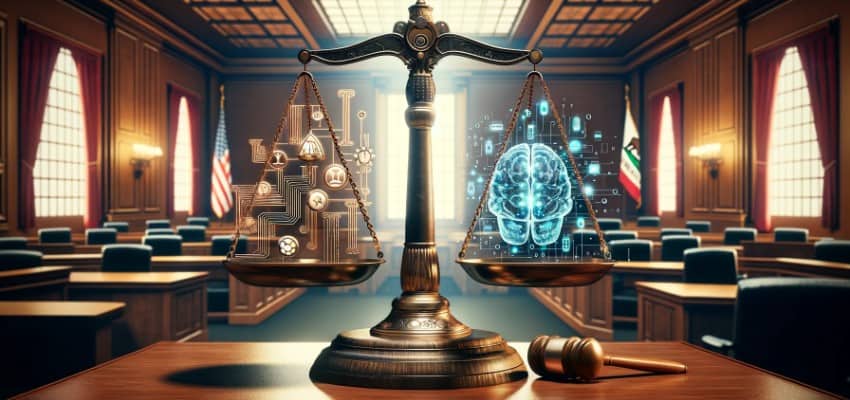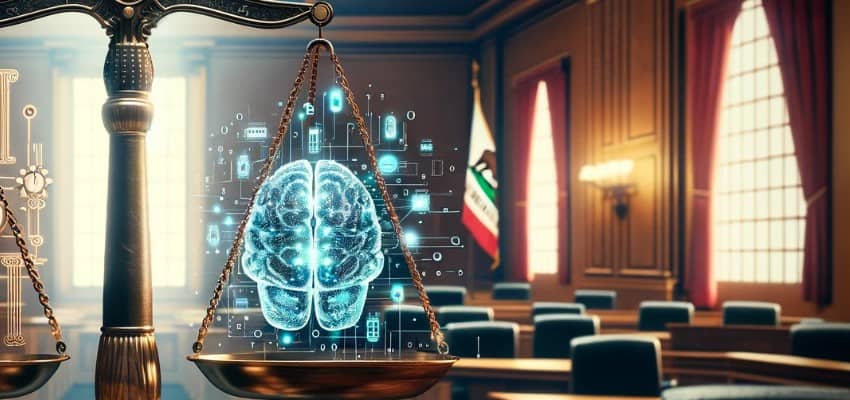|
|
Content Assessment: Legal Tech Meets Ethics: California's New AI Guidelines for Lawyers
Information - 89%
Insight - 88%
Relevance - 91%
Objectivity - 90%
Authority - 91%
90%
Excellent
A short percentage-based assessment of the qualitative benefit expressed as a percentage of positive reception of the recent release by the State Bar of California of detailed guidelines for the use of AI.
Editor’s Note: In this article, we highlight the latest guidance from the State Bar of California’s Standing Committee on Professional Responsibility and Conduct regarding the use of generative artificial intelligence (GAI) in legal practice. GAI refers to a subset of artificial intelligence technologies that are capable of generating content, ideas, or solutions by processing large datasets. These AI systems can synthesize information and create outputs that mimic human-like understanding and creativity. Examples include advanced language models, image generation tools, and AI-driven data analysis systems.
In the legal context, GAI can revolutionize practices by automating research, drafting documents, and even predicting case outcomes based on historical data. However, this technology also brings forth ethical considerations, especially in terms of client confidentiality, the accuracy of generated content, and the potential biases inherent in AI algorithms. The new guidelines by the State Bar of California aim to navigate these challenges, providing a framework for attorneys to ethically integrate GAI into their practices.
Industry News
Legal Tech Meets Ethics: California’s New AI Guidelines for Lawyers
ComplexDiscovery Staff
The State Bar of California, known for its commitment to protecting the public through the regulation of attorneys, has taken a significant step in addressing the burgeoning role of generative artificial intelligence (AI) in legal practice. Recognizing the transformative potential of AI technologies, the Bar’s Standing Committee on Professional Responsibility and Conduct has released a detailed set of guidelines, aiming to ensure that attorneys harness these tools without compromising their ethical obligations.
Generative AI, which can process large volumes of data and emulate human-like responses, offers numerous benefits for law practice, ranging from administrative efficiency to enhanced legal research capabilities. However, its use also raises complex ethical considerations. The new guidelines by the State Bar of California address these challenges, emphasizing the importance of maintaining client confidentiality, ensuring competence and diligence, and upholding the law. Here is a general overview of the new guidelines:
Duty of Confidentiality: Lawyers must not input any confidential client information into GAI solutions lacking adequate confidentiality and security protections. They must anonymize client information and consult with IT professionals or cybersecurity experts to ensure any AI system adheres to stringent security, confidentiality, and data retention protocols.
Duties of Competence and Diligence: Lawyers need to understand the workings, limitations, and terms of use of GAI technology, ensuring competent use and applying diligence with respect to facts and law. Overreliance on AI tools is discouraged, as AI-generated outputs should be used as a starting point and critically analyzed for accuracy and bias.
Duty to Comply with the Law: Lawyers must comply with relevant and applicable legal issues surrounding GAI, including privacy laws, cross-border data transfer laws, intellectual property laws, and cybersecurity concerns. This includes analyzing laws and regulations applicable to both the attorney and the client.
Duty to Supervise: Managerial and supervisory lawyers should establish clear policies on permissible uses of GAI and provide training on its ethical and practical aspects. Subordinate lawyers must not use GAI in ways that violate professional responsibilities.
Communication Regarding GAI Use: Lawyers should disclose to their clients the intent to use GAI, including how the technology will be used and the benefits and risks involved. They should also review any client instructions or guidelines that may limit the use of GAI.
Charging for Work Produced by GAI: Lawyers may charge for actual time spent crafting or refining GAI inputs and reviewing and editing outputs but not for the time saved by using GAI. The costs associated with GAI may be charged to clients in compliance with applicable law, and fee agreements should explain all fees and costs, including those associated with GAI use.
Candor to the Tribunal and Meritorious Claims: Lawyers must review all GAI outputs for accuracy before submission to the court and correct any errors or misleading statements. They should be aware of any jurisdiction-specific rules or orders that may necessitate the disclosure of GAI use.
Prohibition on Discrimination, Harassment, and Retaliation: Lawyers should be aware of possible biases in GAI and the risks they may create, such as in screening potential clients or employees. Continuous learning about AI biases and establishing policies to address potential AI biases is recommended.
According to the guidance, attorneys must exercise caution when inputting sensitive information into AI tools, ensuring adequate security and confidentiality measures are in place. This includes anonymizing client data and critically analyzing AI-generated outputs for accuracy and bias. Overreliance on AI is cautioned against, as it may hinder the critical, human-performed analysis integral to legal practice.
The guidance also touches on the implications of AI in terms of billing practices, stressing that attorneys should only charge for actual time spent on AI-related tasks, not for the time saved by using AI tools. Furthermore, the guidelines call for continuous learning about AI biases and their implications in legal practice, underscoring the need for ongoing vigilance and adaptation as AI technologies evolve.
This initiative by the State Bar of California is a crucial step in navigating the ethical complexities of integrating advanced technologies into the legal profession. It reflects a growing awareness of the need to balance innovation with responsibility, ensuring that the advancements in AI are harnessed to enhance the practice of law while upholding the highest ethical standards.
News Sources
- The State Bar of California
- Practical Guidance for the Use of Generative Artificial Intelligence in the Practice of Law (PDF)
Assisted by GAI and LLM Technologies
Additional Reading
- Exploring the Uptake of LLMs and Generative Artificial Intelligence in the eDiscovery Ecosystem
- Weighing AI’s Benefits and Risks in Litigation and eDiscovery
Source: ComplexDiscovery


























